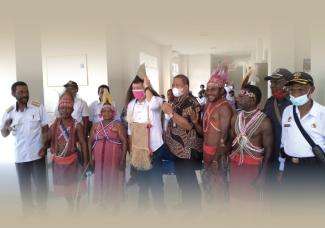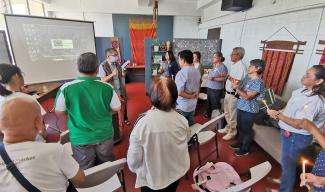On Wednesday, November 18, 2020, at the Tambrauw Regent's Office, Eduardus Tafi as the head of the Clan (Rae) Tafi submitted a proposal to the Regent of Tambrauw Regency to establish ulayat (customary) rights of Rae (Clan) in accordance with the mechanism regulated by the Tambrauw Regency Regional Regulation No. 06/2018, regarding the Recognition and Protection of Customary Law Communities in Tambrauw Regency. Rae Tafi's proposal was accepted by 1st Assistant of the Tambrauw Regency Secretary on behalf of the Regent. Eduardus said that "Together with Rae Tafi, there are 14 clans (Rae) in Fef who have conducted customary deliberations and will carry out customary rights mapping. We plead the local government to help these indigenous people (Rae)”. Together with the proposal letter, the head of the Tafi clan also provided the agreed customary area map, a Rae Tafi profile documen, the management plan for Rae Tafi's customary rights document and the management plan map.
The Submission of this proposal letter witnessed by the Deputy Minister of ATR/Deputy Head of BPN, Dr Surya Tjandra, who is also the Executive Coordinator of Agrarian Reform Task Force (GTRA). In the ATR/BPN Ministry official press release, the Deputy Minister of ATR/Deputy Head of BPN said that "We at the national level, need to learn in order to formulate the agrarian reform that is appropriate with the existing local context in Papua and West Papua. Meanwhile, what we have found here is that we must really understand the existence of recognition and protection for the customary law communities. The Deputy Minister of ATR/Deputy Head of BPN added, “Tambrauw Regency in Particular, due to the enactment of the local regulation, has shown the uniqueness as well as the commitment from the local government. The submission of the clan map determination earlier, was compelling because it must be agreed upon the members in terms of boundaries, history, genealogy, demarcation, etc. This is not an easy task, due to its mandatory participatory process. For us, these information are important, I want to know how the process goes, and may or may not be applied throughout Indonesia, "said Dr Surya Tjandra.
Soter Hae, the Aka Wuon facilitator, still on the same occasion reported that the map of the Tafi Marga customary area that were presented at this stage was the result of a long process of customary deliberation up to the technical mapping. The mapping of the 14 clans' customary territories in Fef was carried out by Aka Wuon during the period of 2016 – 2020, with the support from the Samdhana Institute. In the future, Marga (Rae) Tafi plans to gather the customary areas map, designation decree and its management plans to be registered to the provincial government and proposed to the Minister of Environment and Forestry as Customary Forest. The Marga Tafi initiative is expected to become a model and inspire the other clans in Fef and Tambrauw to immediately facilitate the mapping of customary areas, propose legalization and prepare the management legality.
"Forests and customary land become one unit of customary rights that cannot be separated" Soter Hae emphasized, a representative of the Tafi Marga Indigenous community. Mapping, dispute resolution, and the management plan development of customary areas in the Tafi Marga were carried out due to the fact that their small customary space of around 958 ha should be able to support the growing descendants of the Tafi clan. Proposing its territory to be designated as customary forest is seen as an effort to protect its customary territory from development pressure, especially since its location is at the center of the Tambrauw district government.
The meeting set out in parallel with the Deputy Minister of ATR/Deputy Head of BPN working visits to Papua and West Papua Provinces. The visit aim is to learn and acquire better understanding on the challenges regarding the recognition and protection for the customary law communities in Papua and West Papua. This visit is also part of the efforts to accelerate Welfare Development in Papua and West Papua Provinces, referring to the Presidential Instruction No. 9 of 2020. "This work should involve cross-sectoral, it cannot be done by BPN alone, from the land alone it has been divided into two. forests and not forests, "continued Surya Tjandra.
The Deputy Minister of ATR/Deputy Head of BPN, will visit several places in Papua and West Papua, that is well known for its unique culture from the indigenous people such as the District Tambrauw. In addition, the Deputy Minister of ATR/Deputy Head of BPN are scheduled to visit Manokwari Regency, Sorong Regency and Raja Ampat Regency, where there are indigenous peoples lives on the coast. "Indigenous peoples are also not only on the land but also on the coast. Added to that, we have carried out several activities in collaboration with the Ministry of Marine Affairs and Fisheries”.
In regards to the welfare of the indigenous peoples, the Deputy Minister of ATR/Deputy Head of BPN said that the establishment of the Directorate for Communal Land Management, Institutional Relations and PPAT at the Ministry of ATR/BPN, will assist the local governments in executing the implementation of indigenous peoples protection throughout Indonesia.
Sourcer: Press release Kementerian ATRBPN 19/11/2020 https://www.atrbpn.go.id/?menu=baca&kd=ND6LSekAIfx17uJAkaqkKFP0DBdpKZbvBn0ts18qXxJjQ24T0wc1Diykq7bxxVGY
Report from Yunus (Yumte) Samdhana Institute




